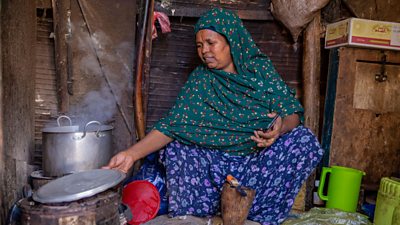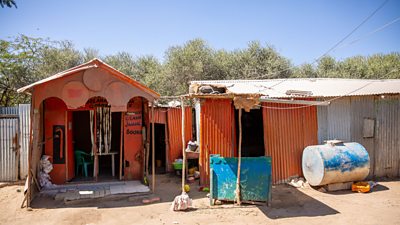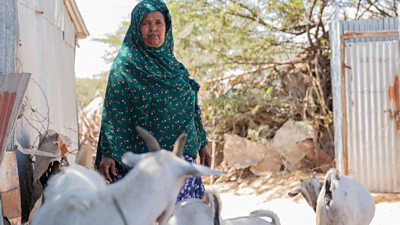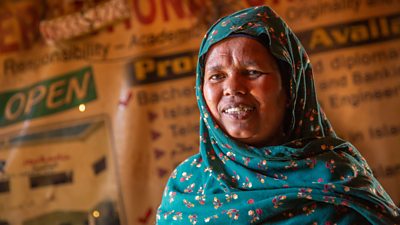Asha's family struggled to make ends meet after her husband, a policeman, had to leave his job due to ill health. Through our project, Somali Women towards Economic Empowerment and Transformation (SWEET), she listened to radio programmes and accessed training that gave her new ideas for business and taught her basic book-keeping skills.
This is her story, as told to our team in Somalia.
“My name is Asha Abdi Abdillahi. I live in State House IDP (internally displaced persons) camp in Hargeisa. I have eight children and their father. I am forty-eight years old. My children are four boys and five girls – I have eight of my own, and we care for a nephew to my husband.
“My husband is Mustafa, 50. He was a police officer but he has laid down his weapons now, because he is disabled. He became diabetic and has hypertension, and had a blood clot in the brain (stroke). He is unable to work much.
“I was in business, since I am a struggling mother trying to provide for her family, since what my husband provided was not enough.
"I tried different things and did not even know my capital and profit. I was just moving."

'Nothing increased - I just got tired and hot'
“I used to cook food and serve tea in a small restaurant … I used to run up and down, and work hard, but I did not record the credits that people have taken. I did not understand, I just used to say they would bring the money later…. I did not know even when people left without paying.
“I did not know what I put into the pot and what I got out of it. My aim was to just feed the children. Nothing increased, I just got tired and hot.
“But, since you guys started training us, we started writing down what we have profited within the first three months. I understand what I have, what is the capital and what I have lent to my customers.
“Before, I was just working to feed my children and did not think of anything beyond that. I just cooked, fed them and even sometimes I borrowed what to cook from the shop. Now, I have a book where I record and know what is out there. Bookkeeping is one of the things I learned from the training.
"I record my expenditure and calculate my profit. I put in what I have spent buying things from the shops. I put the income profit aside, take what I need for buying things and keep the capital constant. I used to get worried when I had a visitor because I did not know what to give them as bus fare, but now, I have confidence. We have received great encouragement and we thank God for that."

'My morale has improved'
"Now I know that if the business is not doing well, you have to change the location and seek a better place with a better number of customers. We were trained also how to welcome our customers with an open face and treat the customers well. If the customer does not get a warm welcome, they won’t come back and that would be a blow to the business.
"My morale has improved. I used to be a worried and closed person because I did not know the difference between loss and profit.
"When I started in business, I used to cook a small amount of maize, small wheat, small oats and I used to make trubo (intestines filled with spices and vegetables and cut like sausages). We all have minds and brains, but Somalis have one problem and that is copying what they see. I changed and started making lunch, tea and expanding the business. Then the lady in the next-door business started to sell maize meal and wheat meal. So I changed and stopped that. I said, let her grow. I moved on and expanded mine.
"I also buy goats, and fatten them. The ones that give birth, I keep them, they are here. The rest, I fatten them and sell them for profit.
"I started with the goats after the training. Before that – how could I even save money? I did not even know what profit was. Run, feed, run, feed was my story.
"The goats come when they are ugly and thin, they are fed, and when they become fat, they are sold with some profit."
'I use the profits to help my family'
"I hope to expand and make it a mixed business and look for a big place at a central location.
"I use the profits to help my family.
"My father for instance, lives in the rural area. He would call and tell me that he needed money to buy water for the livestock. I have become a happy person who is relied upon, in the urban area as well as in the rural. I cover school fees and the girls’ needs, thanks to God.
"Three of the children are in primary school, three of them are in secondary schools, and another has completed and is a job seeker.
"To other mothers out there who don’t know, or are in the situation we were in, I say they should get awareness. They should be encouraged, and if we are asked, we can go and encourage them and show them how they should work.
"People say about me, 'Asha is hard working. She has borne fruits of her hard struggle, with a lot of courage. You are even better now. People are wearing out but even with all the struggle, you are even getting better.'"

Somali Women towards Economic Empowerment and Transformation (SWEET) is funded by the Norwegian Agency for Development Cooperation (Norad). Learn more about the project.
